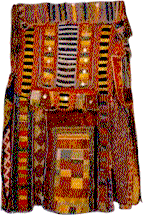 Egun-Ancestor Reverence
Egun-Ancestor Reverence Egun-Ancestor Reverence
Egun-Ancestor Reverenceby Shloma Rosenberg
Egun
are the spirits of departed ancestors, whether related by blood or by religious lineage. Honoring one's ancestors can be viewed in simple or in complex, metaphysical terms, which we will examine here.When an individual is born, her soul incarnates, that is, takes on a physical body. This soul comes from a constellation of energy that continuously incarnates within a family line. This is a very broad concept, because all family lines eventually return to one people. However, it is commonly believed that familiar energies tend to stay together, which is why we bear the traits of our recent ancestors. While the soul is here, it gathers wisdom and knowledge through its experiences on this plane. When the individual dies, the spirit disincarnates and returns to that constellation of energies, the cull of souls, if you will, to await reincarnation.
Because time is not a reality but a series of labels we put on reality to be able to comprehend events in some sort of order, we must understand that all incarnations of all souls exist simultaneously. We are all living one big life. This is why so many people can cite so many varied experiences in past lives and why so many people experience the lives of famous people as their own past lives. We can all believe that we were Cleopatra or Queen Elizabeth because we all were! This is also the main reason we revere our ancestors: to revere our source, those experiences that our souls have had beyond those which they are having in their current incarnation. When I give offerings to my grandfather, I am "feeding" that part of myself and my family line that lived the life my grandfather lived. When I continue my relationship with a deceased family member, it is because, in some way, that relative still exists, whether the particular energy that powered the particular body of that family member has reincarnated or not. To have existed at one time is to exist eternally. To deny the importance of the experiences that our souls had and continue to have on other planes of existence is to deny our very selves.
When we are told that an Egun has a problem with us or that an Egun wants our attention, what we are really being told is that we are neglecting some part of the experience of our ancestral soul that needs attention and the energy that a particular offering can give.
It is important to remember that, regardless of our thirst for understanding, we must be careful not to pick these concepts apart to the point at which they sound like mathematical formulae. We must remember that those souls, even though they are a part of us, have their own feelings, thoughts, and emotions that remain autonomous. Our Egun can be happy, sad, or pissed off. They are not static pictures of our past lives. They are still our mothers, fathers, sisters, brothers and grandparents regardless of our understanding of the metaphysics behind their existence.
An important aside to our understanding of Egun is to realize the importance of our treatment of each other. To realize that we are all living one big life is to realize that the evolution of each individual is important to the evolution of the community as a whole. To treat each other poorly is to go against the positive evolution of the whole. To foment that evolution, we must create and maintain firm and fruitful connections with all of our relations, living and dead. It is the realization of our interrelated existence and the willingness to contribute to its productive growth that will heal our world and carry us into ever-improving creation.